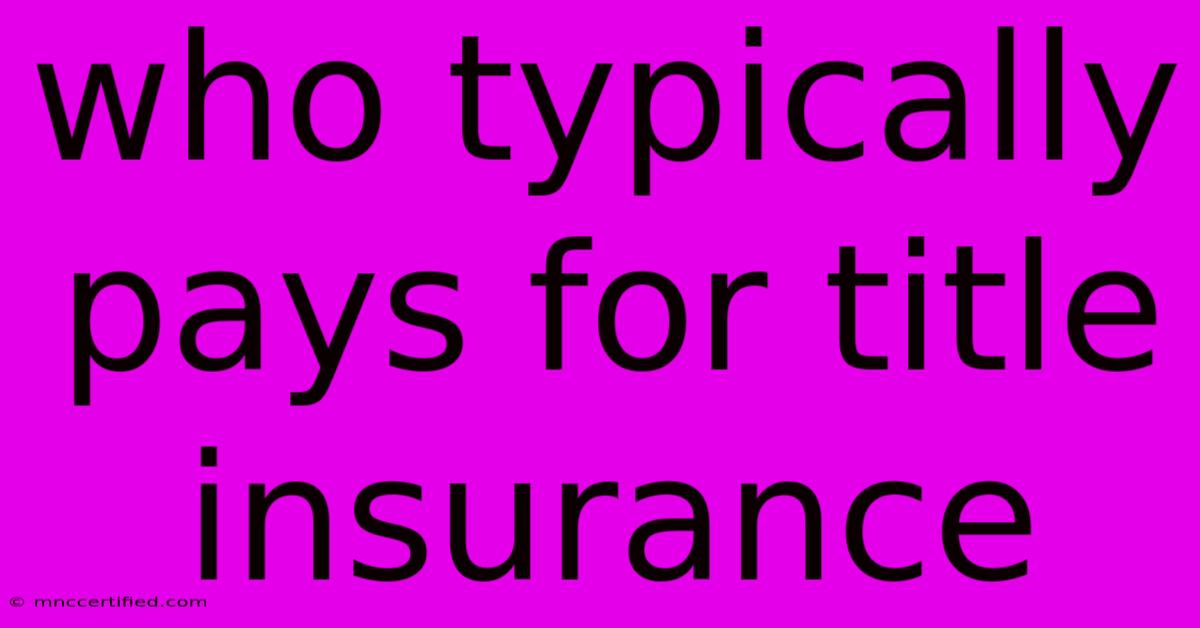Who Typically Pays For Title Insurance

Table of Contents
Who Pays for Title Insurance? Understanding the Cost of Protecting Your Property
Buying a home is a significant financial investment, and ensuring clear ownership is paramount. Title insurance plays a crucial role in this process, protecting you from unforeseen title defects that could jeopardize your ownership rights. But who typically pays for title insurance?
The Buyer Usually Pays for Title Insurance
In most real estate transactions, the buyer is responsible for paying the title insurance premium. This is a common practice across the United States and is typically outlined in the purchase agreement.
Here's why:
- Protection for the Buyer: Title insurance primarily protects the buyer from potential title issues that could arise after the purchase. The policy safeguards the buyer's investment, providing peace of mind knowing they have a clear and marketable title.
- Lender's Requirement: Often, lenders require borrowers to obtain lender's title insurance. This protects the lender's investment in the property in case of title defects.
- Market Standard: Paying for title insurance is an established practice in the real estate industry. It's generally expected and considered a standard part of the closing costs.
When the Seller May Contribute to Title Insurance Costs
While buyers typically shoulder the cost of title insurance, there are situations where the seller may contribute or even cover the entire premium. This can happen in:
- Negotiated Agreements: During the negotiation process, buyers may request that the seller contribute to the title insurance costs. This can be particularly relevant in a competitive market or when the property has a complex title history.
- Seller's Market: In a seller's market where there are more buyers than properties, sellers may offer to cover some or all of the title insurance costs to make their property more attractive.
- Seller's Preference: Some sellers may be willing to pay for title insurance to avoid any potential issues that could arise from a title defect after the sale.
Understanding the Benefits of Title Insurance
Regardless of who pays for it, title insurance provides essential protection for both buyers and lenders. It safeguards your investment by covering:
- Unrecorded Liens: Unpaid property taxes, judgments, or other liens that could be a claim against your property.
- Forgeries and Fraud: Cases where a previous owner forged documents or committed fraud to transfer ownership.
- Boundary Disputes: Issues with property lines or easements that could impact your use of the property.
Choosing the Right Title Insurance Company:
When selecting a title insurance company, it's essential to do your research and choose a reputable provider with a strong track record. Consider factors like:
- Reputation: Look for companies with a history of providing excellent customer service and handling claims fairly.
- Experience: Opt for companies with extensive experience in the real estate industry.
- Coverage Options: Ensure the policy offers sufficient coverage for your needs.
- Pricing: Compare quotes from different companies to find the best value for your budget.
In Conclusion:
While the buyer usually pays for title insurance, understanding the nuances of who pays and the benefits it provides is crucial. By understanding these factors and choosing a reliable title insurance company, you can ensure a smooth and secure real estate transaction.

Thank you for visiting our website wich cover about Who Typically Pays For Title Insurance. We hope the information provided has been useful to you. Feel free to contact us if you have any questions or need further assistance. See you next time and dont miss to bookmark.
Featured Posts
-
Gold Bond Rough And Bumpy Skin Reviews
Nov 09, 2024
-
Kylian Mbappe Exits France Team Didier Factor
Nov 09, 2024
-
Valley Suns Broadcast Schedule For 2023 Season
Nov 09, 2024
-
Most Valuable Batman Trading Cards 1989
Nov 09, 2024
-
Winchester Power Max Bonded 350 Legend
Nov 09, 2024